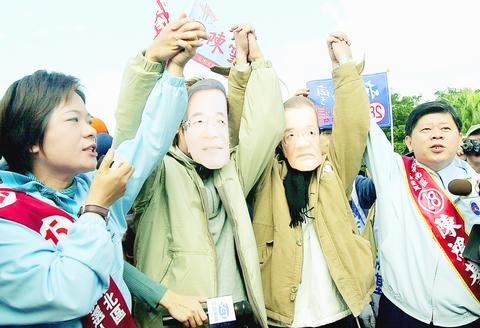As Taiwan counts down to election day, a group of protesters yesterday called for a post-poll coalition between the ruling DPP and the opposition KMT to break the legislative gridlock and save the economy.
Impersonators of President Chen Shui-bian (陳水扁) and KMT Chairman Lien Chan (連戰), walked down a red carpet outside the Presidential Office for a conciliation handshake, escorted by the two KMT candidates who organized the protest.

PHOTO: CHIANG YING-YING, TAIPEI TIMES
The candidates urged the DPP and the KMT to set aside their enmity and cooperate to save the nation's economy, which has plunged into recession with unemployment climbing to record levels.
"KMT-DPP cooperation to save Taiwan," the candidates, Chen Horng-chi (
Chen, who ended 55 years of KMT rule after winning last year's presidential poll, has sent up trial balloons lately, offering to share power with opposition parties in a broadbased post-election coalition government.
Opposition leaders have cold-shouldered Chen's reconciliation overtures, insisting the party with the most number of seats in parliament should form the new Cabinet.
Yesterday's protest was seen by analysts as a sign of an emerging rift in the ranks of the KMT, who suspect the DPP plans to poach its legislators after the elections.
Beating gongs and drums, a convoy of 400 cars stretching several kilometers drove to the Presidential Office and blew their horns in a show of support for political reconciliation between the KMT and the DPP.
"We hope the two parties set aside their enmity to save Taiwan's economy," protest leader Chen Hsueh-fen said.
Riot police armed with clubs and shields stood by and barbed-wire barricades were set up on streets leading to the Presidential Office.
No violence was reported.
On Saturday, about 1,500 flag-waving protesters marched through the capital, calling for the KMT to merge with their splinter parties to help its chances of recapturing the presidency in 2004.

INVESTIGATION: The case is the latest instance of a DPP figure being implicated in an espionage network accused of allegedly leaking information to Chinese intelligence Democratic Progressive Party (DPP) member Ho Jen-chieh (何仁傑) was detained and held incommunicado yesterday on suspicion of spying for China during his tenure as assistant to then-minister of foreign affairs Joseph Wu (吳釗燮). The Taipei District Prosecutors’ Office said Ho was implicated during its investigation into alleged spying activities by former Presidential Office consultant Wu Shang-yu (吳尚雨). Prosecutors said there is reason to believe Ho breached the National Security Act (國家安全法) by leaking classified Ministry of Foreign Affairs information to Chinese intelligence. Following interrogation, prosecutors petitioned the Taipei District Court to detain Ho, citing concerns over potential collusion or tampering of evidence. The

‘FORM OF PROTEST’: The German Institute Taipei said it was ‘shocked’ to see Nazi symbolism used in connection with political aims as it condemned the incident Sung Chien-liang (宋建樑), who led efforts to recall Democratic Progressive Party (DPP) Legislator Lee Kun-cheng (李坤城), was released on bail of NT$80,000 yesterday amid an outcry over a Nazi armband he wore to questioning the night before. Sung arrived at the New Taipei City District Prosecutors’ Office for questioning in a recall petition forgery case on Tuesday night wearing a red armband bearing a swastika, carrying a copy of Adolf Hitler’s Mein Kampf and giving a Nazi salute. Sung left the building at 1:15am without the armband and apparently covering the book with a coat. This is a serious international scandal and Chinese

Seventy percent of middle and elementary schools now conduct English classes entirely in English, the Ministry of Education said, as it encourages schools nationwide to adopt this practice Minister of Education (MOE) Cheng Ying-yao (鄭英耀) is scheduled to present a report on the government’s bilingual education policy to the Legislative Yuan’s Education and Culture Committee today. The report would outline strategies aimed at expanding access to education, reducing regional disparities and improving talent cultivation. Implementation of bilingual education policies has varied across local governments, occasionally drawing public criticism. For example, some schools have required teachers of non-English subjects to pass English proficiency

TRADE: The premier pledged safeguards on ‘Made in Taiwan’ labeling, anti-dumping measures and stricter export controls to strengthen its position in trade talks Products labeled “made in Taiwan” must be genuinely made in Taiwan, Premier Cho Jung-tai (卓榮泰) said yesterday, vowing to enforce strict safeguards against “origin laundering” and initiate anti-dumping investigations to prevent China dumping its products in Taiwan. Cho made the remarks in a discussion session with representatives from industries in Kaohsiung. In response to the US government’s recent announcement of “reciprocal” tariffs on its trading partners, President William Lai (賴清德) and Cho last week began a series of consultations with industry leaders nationwide to gather feedback and address concerns. Taiwanese and US officials held a videoconference on Friday evening to discuss the